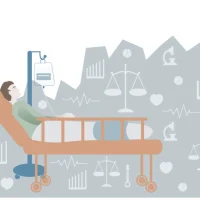HealthManagement, Volume 18 - Issue 1, 2018

Healthcare experts around the globe weigh in on the future of the sector.
Globally-crowdsourced input has shown that technology will trigger huge transformation in healthcare in the next decade with early adopters reaping long-term rewards.
Healthcare is changing rapidly in the face of technological advancements—with groundbreaking innovations such as 3D printing and artificial intelligence (AI involved in paving the way to the future. Hospital leaders anticipate that the new hospital design on the horizon will lead to higher quality care, improved operational efficiencies, and increased patient satisfaction; however, in order for individual hospitals to achieve these results, a focused strategy should be followed.
Compelled to learn what the hospital of the future might look like, the Deloitte Centre for Health Solutions
conducted a crowdsourcing simulation with 33 experts from across the globe, and this has been used to devise a strategy which managers can use as a star ting ground to move their hospitals into the future.
Participants in the crowdsourcing simulation included health care CXOs, physician and nurse leaders, public policy leaders, technologists, and futurists. Their charge was to come up with specific use cases for the design of digital hospitals throughout the world in 10 years’ time—a period that can offer hospital leaders and boards time to prepare.
It is not only rapidly evolving technologies that are expected to alter hospitals worldwide, but also demographic shifts and economic changes. With ageing infrastructure in some countries and increased demand for more beds in others, hospital executives and governments should consider rethinking how to optimise inpatient and outpatient settings and integrate digital technologies into traditional hospital services to truly create a health system without walls.
A Focus on the Shifting Landscape
The crowdsourcing simulation developed use cases in five categories, which are outlined here:
Redefined care delivery
Emerging features, including the development of centralised digital centres to enable decision-making (think: air traffic control for hospitals), continuous clinical monitoring, targeted treatments (such as 3D printing for surgeries), and the use of smaller, portabledevices will help to characterise acute-care hospitals.
The digital patient experience
Digital and AI technologies can help enable on-demand interaction as well as seamless processes that improve patient experience.
Enhanced talent development
Robotic process automation (RPA) and AI can allow caregivers to spend more time providing care and less
time documenting it.
Operational efficiencies through technology
Digital supply chains, automation, robotics, and next generation interoperability can drive operations management and back-office efficiencies.
Healing and well-being designs
The wellbeing of patients and staff members—with an emphasis on the importance of environment and
experience in healing—will likely be impor tant in future hospital designs.
Many of these use case concepts are already in play, so hospital executives should be planning how to integrate technology into newly-built facilities and retrofit it into older ones.
Although the crowdsourcing simulation suggests that technology will likely underlie most aspects of future hospital care, it recognises that care delivery — especially for complex patients and procedures—will likely still require hands-on human expertise.
Building your strategy
The crowdsourcing simulation defined some core elements that should be present in an enterprise digital strategy to help hospital leaders get started in the move towards the future. These include:
Create a culture for digital transformation
It is essential that senior management understands the importance of a digital future and drives support for its implementation at all organisational levels.
Consider technology that communicates
Digital implementation is complex. Connecting disparate applications, devices, and technologies—all highly interdependent — and making certain they talk to each other can be critical to a successful digital
implementation.
Play the long game
Since digital technologies are ever evolving, flexibility and scalability during implementation can be critical. The planning team should confirm that project scope includes adding, modifying, or replacing technology at
lower costs.
Focus on data
While the requirements of data interoperability, scalability, productivity, and flexibility are important, they should be built upon a solid foundation of capturing, storing, securing, and analysing data.
Prepare for Talent 2.0
As hospitals invest in exponential technologies, they should provide employees with ample oppor tunities to develop corresponding digital strategies. Hospital leaders may not see immediate returns on investments in people, technology, processes, and premises, but in the longer-term—as digital technologies improve care
delivery, create operational efficiencies,and enhance patient and staff experience — the return result can be in higher quality care, improved operational efficiencies, and increased patient satisfaction.
Key Points
- A crowdsourcing simulation with global experts has created a template strategy on future hospitals for managers
- Technology will be a key driver in transformational change as well as demographic and economic shift
- Huge changes are predicted in care delivery, the digital patient experience, enhanced talent development, healthcare design and robotic process automation
- Core elements present in an enterprise digital strategy should include having a long-term view, focus on data and creation of a digital culture



